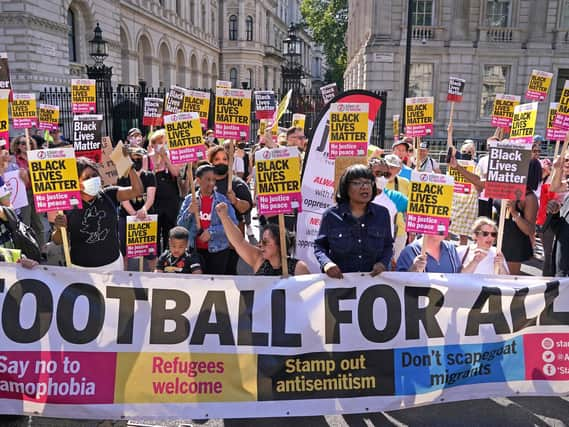'Racist abuse hurled at Marcus Rashford, Jadon Sancho and Bukayo Saka after Euro 2020 final shines light on menace of online hate'


The English players Marcus Rashford, Jadon Sancho and Bukayo Saka were subjected to sickening racist abuse online after missing their spot-kicks in the final against Italy.
Jon Best, the senior duty officer at Crisp, told the Leeds Digital Festival that football clubs, players and sponsors are facing a set of ever-evolving online threats.
Advertisement
Hide AdAdvertisement
Hide AdHe added: “Serious wellbeing concerns have been raised by players, veterans and fan groups about lack of action. Hate speech and abuse is destroying fan communities. Physical threats have been aimed at players, managers and officials, Misogyny, racism and harassment has been posted to female athletes and youth players.”
Mr Best quoted the Hate Track Project, which said: “Processes of adapting and learning mean that racist speech is dynamic and evolving, often using tropes such as slang, circumlocutions, irony and ambiguity.”
The event, which had the title - Tackling racism online in sport - an actor focused approach - highlighted the work Leeds-based Crisp is carrying out with brands around the world to reduce the spread of online abuse and harassment.
Crisp’s “actor” analysis, which focuses on the activities of individuals on social media, revealed that recent abuse was spread by around 1.7m “actors”. Around 50 per cent of this hate was spread by just 12,815 “actors”, the presentation was told.
Advertisement
Hide AdAdvertisement
Hide AdMr Best added: “There are minorities within sporting communities that consistently show their fickle nature, amplified by the perceived anonymity afforded by social media, where teams lose important games after long periods of seemingly un-erring support.
“Support or condemnation can change within seconds or minutes.”
He contrasted the favourable comments on social media about Rashford, Sancho and Saka before they missed the penalties, with the vile racist abuse they endured following England’s defeat.
Mr Best said this incident “shone a bright light on what people have been battling with.”
Advertisement
Hide AdAdvertisement
Hide AdHe said Crisp’s technology could help discover groups of people posting online abuse and track their behaviour across multiple open and closed platforms.
Crisp provides early-warning risk intelligence for leading brands and was founded with the aim of protecting children using online games and social networks from abuse.
Mr Best, who is a former director of intelligence at West Yorkshire Police, outlined how Crisp is tackling online racism and misogyny in sport.
Mr Best said: “Social media can be a battleground of hate. We need to work together across society to win this battle.”
Crisp’s team of 650 analysts can remove harmful content in just 15 minutes.